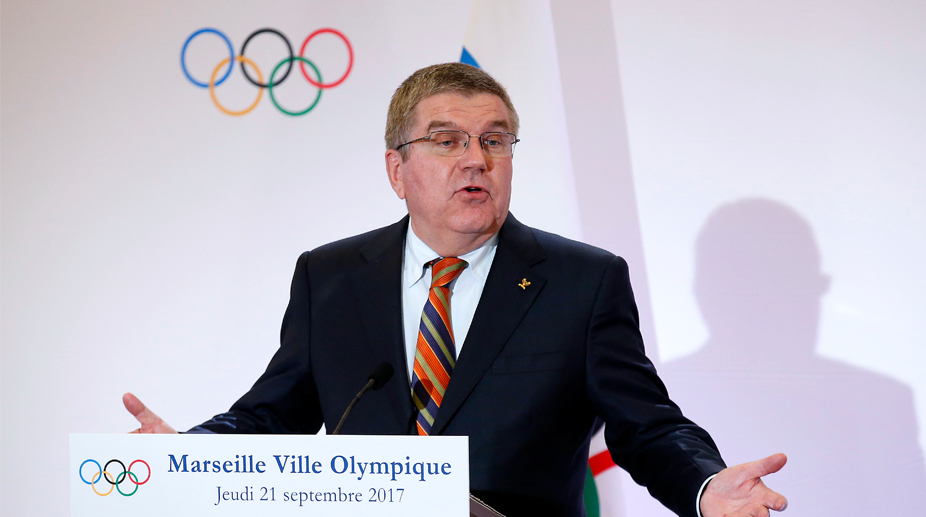Expect US to brief us about Saudi Arabia meeting on Ukraine: Russia
Russia on Tuesday said that it expects that the United States will brief Moscow on the outcome of the US-Ukraine meeting in Saudi Arabia's Jeddah.
The sanction was the toughest ever levelled by the IOC for drug cheating.

IOC President Thomas Bach (Photo : AFP)
Russia was banned from the 2018 Winter Games by the International Olympic Committee over its state-orchestrated doping programme, but clean Russian athletes will be allowed to compete under an Olympic flag.
The sanction was the toughest ever levelled by the IOC for drug cheating and was delivered just 65 days ahead of the Winter Olympics in Pyeongchang, South Korea.
Advertisement
In announcing the decision, IOC president Thomas Bach accused Russia of “perpetrating an unprecedented attack on the integrity of the Olympic Games and sport”.
Advertisement
An explosive report by the World Anti-doping Agency (WADA) and two subsequent IOC investigations have confirmed that Russian athletes took part in an elaborate drug cheating programme which peaked during the 2014 Winter Olympics in Sochi.
Mounting evidence has indicated that the scheme involved senior government officials, including from the sports ministry, with help from secret state agents.
The IOC also banned Russia’s Deputy Prime Minister Vitaly Mutko — who was sports minister during the Sochi Games — for life.
Mutko is currently the head of the organising committee for the 2018 World Cup, which Russia is hosting.
Attention will quickly turn to see if football’s world governing body FIFA allows the scandal-tainted ally of President Vladimir Putin to retain his senior World Cup role.
In a statement, FIFA said it had “taken note” of the IOC decision but it had “no impact on the preparations” for Russia 2018.
After reviewing the case against Russia at a meeting in Lausanne, Switzerland, the IOC also suspended the country’s Olympic Committee (ROC) and its chief Alexander Zhukov.
Zhukov said he “apologised” to the IOC on Tuesday for the “anti-doping violations” committed in his country in recent years.
The IOC had the option of hitting Russia with a blanket ban, the so-called nuclear option that was applied to apartheid-era South Africa from 1964 to 1988.
The IOC’s decision to choose a more moderate path does offer some Russian athletes a route to competing in the Games — although that will be by invitation only and dependent on a stringent testing programme.
“The IOC, at its absolute discretion, will ultimately determine the athletes to be invited from the list,” the IOC said in a statement.
No Russian athlete with a previous doping violation will be allowed to compete and no official who had a leadership role at Sochi 2014 will be invited to Pyeongchang.
Those athletes who do go to the Games, which start on February 9, will participate under the name “Olympic Athlete from Russia”.
The country’s flag will not fly at any 2018 ceremony, the IOC also said in a statement.
Bach said those measures amounted to “proportional sanctions for this systemic manipulation” committed by Russia.
The US Olympic Committee praised the IOC’s “strong and principled decision.
“There were no perfect options, but this decision will clearly make it less likely that this ever happens again,” it said.
The head of the German Olympic Sports Confederation, Alfons Hoermann, called it “historic”.
Russian officials have previously met doping accusations with defiance.
Mutko has said the allegations were an attempt “to create an image of an axis of evil” against his country while Putin has warned that a Russia ban would cause “serious harm to the Olympic movement”.
He said forcing Russian athletes to compete under a neutral flag would amount to a national “humiliation.”
That has fuelled speculation that Moscow would instruct its athletes to boycott the compromise solution decided by the IOC.
“An Olympic boycott has never achieved anything,” Bach said, insisting that given the window left open for clean athletes to compete, a boycott was unnecessary.
Speaking to Russian TV, the president of Russia’s Bobsleigh Federation, Alexander Zubkov said: “This is humiliation. This is a punch in the stomach.”
Russia have been stripped of 11 of their 33 Sochi medals for cheating, meaning they have lost their position at the top of the medals table to Norway.
Advertisement